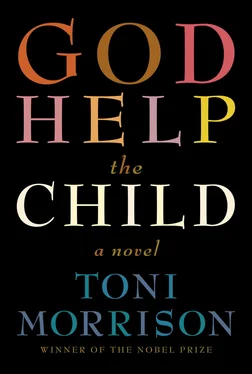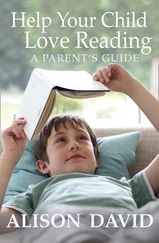Rain giggled on occasion as she described her homeless life, relishing her smarts, her escapes, while Bride fought against the danger of tears for anyone other than herself. Listening to this tough little girl who wasted no time on self-pity, she felt a companionship that was surprisingly free of envy. Like the closeness of schoolgirls.
She’s gone, my black lady. That time I saw her stuck in the car her eyes scared me at first. Silky, my cat, has eyes like that. But it wasn’t long before I began to like her a lot. She’s so pretty. Sometimes I used to just look at her when she was sleeping. Today her car came back with a busted-up door of another color. Before she left she gave me a shaving brush. Steve has a beard and doesn’t want it so I use it to brush my cat’s fur. I feel sad now she’s gone. I don’t know who I can talk to. Evelyn is real good to me and so is Steve but they frown or look away if I say stuff about how it was in my mother’s house or if I start to tell them how smart I was when I was thrown out. Anyway I don’t want to kill them like I used to when I first got here. But then I wanted to kill everybody — until they brought me a kitten. She’s a cat now and I tell her everything. My black lady listens to me tell how it was. Steve won’t let me talk about it. Neither will Evelyn. They think I can read but I can’t, well maybe a little — signs and stuff. Evelyn is trying to teach me. She calls it home-schooling. I call it home-drooling and home-fooling. We’re a fake family — okay but fake. Evelyn is a good substitute mother but I’d rather have a sister like my black lady. I don’t have a daddy, I mean I don’t know who he is because he didn’t live in my mother’s house but Steve is always here unless he’s doing some day work somewhere. My black lady is nice but tough too. When we started walking back home after I told her everything about my life before Evelyn and Steve, a truck with big boys in it passed us. One of them hollered “Hey, Rain. Who’s your mammy?” My black lady didn’t turn around but I stuck out my tongue and thumbed my nose at him. One of them was Regis, a boy I know because he comes to our house sometimes with his father to give us firewood or baskets of corn. The driver, an older boy, turned the truck around so they could come after us. Regis pointed a shotgun just like Steve’s at us. My black lady saw him and threw her arm in front of my face. The birdshot messed up her hand and arm. We fell, both of us, her on top of me. I saw Regis duck down as the truck gunned its engine and shot off. What could I do but help her up and hold on to her bloody arm as we hurried back to our house as fast as her ankle would let her. Steve picked the tiny pellets out of her hand and arm, saying he was going to warn Regis’s father. Evelyn washed the blood off my black lady’s skin and poured iodine all over her hand. My black lady made a hurt face but she didn’t cry. My heart was beating fast because nobody had done that before. I mean Steve and Evelyn took me in and all but nobody put their own self in danger to save me. Save my life. But that’s what my black lady did without even thinking about it.
She’s gone now but who knows maybe I’ll see her again sometime.
I miss my black lady.

Blood stained his knuckles and his fingers began to swell. The stranger he’d been beating wasn’t moving anymore or groaning, but he knew he’d better walk away quickly before a student or campus guard thought he was the lawless one instead of the man lying on the grass. He’d left the beaten man’s jeans open and his penis exposed just the way it was when he first saw him at the edge of the campus playground. Only a few faculty children were near the slide and one was on the swing. None apparently had noticed the man licking his lips and waving his little white gristle toward them. It was the lip licking that got to him — the tongue grazing the upper lip, the swallowing before its return to grazing. Obviously the sight of the children was as pleasurable to the man as touching them because just as obviously, in his warped mind, they were calling to him and he was answering their plump thighs and their tight little behinds, beckoning in panties or shorts as they climbed up to the slide or pumped air on the swing.
Booker’s fist was in the man’s mouth before thinking about it. A light spray of blood dappled his sweatshirt, and when the man lost consciousness, Booker grabbed his book bag off the ground and walked away — not too fast, but fast enough to cross the road, turn his shirt inside out and make it to class on time. He didn’t make it, but there were a few others sneaking into the lecture hall when he arrived. The latecomers took seats in the last rows and plopped backpacks, briefcases or laptops on their desks. Only one of them took a notebook out. Booker preferred pencil on paper too, but his swollen fingers made writing difficult. So he listened a little, daydreamed a little and covered his mouth to hide his yawns.
The professor was going on and on about Adam Smith’s wrongheadedness, as he did in almost every lecture, as though the history of economics had only one scholar worth trashing. What about Milton Friedman or that chameleon Karl Marx? Booker’s obsession with Mammon was recent. Four years ago, as an undergraduate, he’d nibbled courses in several curricula, psychology, political science, humanities, and he’d taken multiple courses in African-American Studies, where the best professors were brilliant at description but could not answer to his satisfaction any question beginning with “Why.” He suspected most of the real answers concerning slavery, lynching, forced labor, sharecropping, racism, Reconstruction, Jim Crow, prison labor, migration, civil rights and black revolution movements were all about money. Money withheld, money stolen, money as power, as war. Where was the lecture on how slavery alone catapulted the whole country from agriculture into the industrial age in two decades? White folks’ hatred, their violence, was the gasoline that kept the profit motors running. So as a graduate student he turned to economics — its history, its theories — to learn how money shaped every single oppression in the world and created all the empires, nations, colonies with God and His enemies employed to reap, then veil, the riches. He habitually contrasted the beaten, penniless, half-naked King of the Jews screaming betrayal on a cross with the bejeweled, glamorously dressed pope whispering homilies above the Vatican’s vault. The Cross and the Vault by Booker Starbern. That would be the title of his book.
Unimpressed by the lecture, he let his thoughts slide toward the man lying exposed near the playground. Bald. Normal-looking. Probably an otherwise nice man — they always were. The “nicest man in the world,” the neighbors always said. “He wouldn’t hurt a fly.” Where did that cliché come from? Why not hurt a fly? Did it mean he was too tender to take the life of a disease-carrying insect but could happily ax the life of a child?
Booker had been raised in a large, tight family with no television in sight. As a freshman in college he lived surrounded by a television/Internet world where both the methods of mass communication and the substance of mass communication seemed to him loaded with entertainment but mostly free of insight or knowledge. The weather channels were the only informative sources but they were off-base and hysterical most of the time. And the video games — mesmerizing in pointlessness. Having grown up in a book-reading family with only radio and newspapers for day-to-day information and vinyl records for entertainment, he had to fake his classmates’ enthusiasm for the screen sounds of games blasting from every dorm room, lounge and student-friendly bar. He knew he was way, way out of the loop — a Luddite incapable of sharing the exciting world of tech, and it had embarrassed him as a freshman. He had been shaped by talk in the flesh and text on paper. Every Saturday morning, first thing before breakfast, his parents held conferences with their children requiring them to answer two questions put to each of them: 1. What have you learned that is true (and how do you know)? 2. What problem do you have? Over the years answers to the first question ranged from “Worms can’t fly,” “Ice burns,” “There are only three counties in this state,” to “The pawn is mightier than the queen.” Topics relevant to the second question might be “A girl slapped me,” “My acne is back,” “Algebra,” “The conjugation of Latin verbs.” Questions about personal problems prompted solutions from anyone at the table, and after they were solved or left pending, the children were sent to bathe and dress — the older ones helping the younger. Booker loved those Saturday morning conferences rewarded by the highlight of the weekend — his mother’s huge breakfast feasts. Banquets, really. Hot biscuits, short and flaky; grits, snow-white and tongue-burning hot; eggs beaten into pale saffron creaminess; sizzling sausage patties, sliced tomatoes, strawberry jam, freshly squeezed orange juice, cold milk in Mason jars. Some food she stored up for those weekend feasts because during the rest of the week they ate frugally: oatmeal, in-season fruit, rice, dried beans and whatever green leaf was available: kale, spinach, cabbage, collards, mustard or turnip greens. Those weekend breakfast menus were deliberately sumptuous because they followed days of scarcity.
Читать дальше












